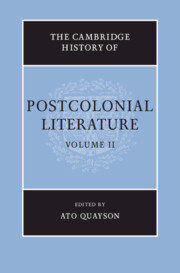Book contents
- Frontmatter
- 21 The language question in India and Africa
- 22 English and the development of postcolonial literature
- 23 Religion and postcolonial writing
- 24 Postcolonial responses to the Western canon
- 25 Island writing, Creole cultures
- 26 Magical realism
- 27 Palimpsest and hybridity in postcolonial writing
- 28 The narrative forms of postcolonial fiction
- 29 Poetry and postcolonialism
- 30 Primitivism and postcolonial literature
- 31 Popular culture and postcolonial literary production in Africa and India
- 32 Film and postcolonial writing
- 33 Fanon, Memmi, Glissant and postcolonial writing
- 34 Negritude and postcolonial literature
- 35 Publishing, prizes and postcolonial literary production
- 36 Key journals and organizations
- Bibliography
- Index
- References
35 - Publishing, prizes and postcolonial literary production
Published online by Cambridge University Press: 28 January 2012
- Frontmatter
- 21 The language question in India and Africa
- 22 English and the development of postcolonial literature
- 23 Religion and postcolonial writing
- 24 Postcolonial responses to the Western canon
- 25 Island writing, Creole cultures
- 26 Magical realism
- 27 Palimpsest and hybridity in postcolonial writing
- 28 The narrative forms of postcolonial fiction
- 29 Poetry and postcolonialism
- 30 Primitivism and postcolonial literature
- 31 Popular culture and postcolonial literary production in Africa and India
- 32 Film and postcolonial writing
- 33 Fanon, Memmi, Glissant and postcolonial writing
- 34 Negritude and postcolonial literature
- 35 Publishing, prizes and postcolonial literary production
- 36 Key journals and organizations
- Bibliography
- Index
- References
Summary
A new urge to understand the local vis-à-vis the global has materialized in commercial strategies – such as, for example, the leading role of powerful literary agents, publishing houses’ promotion campaigns, international literary prizes, media coverage, internet sites – which all allow for the successful marketing of postcolonial writers to an international readership. This chapter addresses the relationship between postcolonial literature and the publishing industry, and focuses in particular on how institutions such as literary prizes have contributed towards shaping the field and have influenced the level of production, consumption and distribution.
Over the last three decades, in fact, unprecedented numbers of postcolonial authors have successfully managed to acquire visibility, celebrity and a lasting place in the canon by being awarded important literary prizes, such as the Nobel, Commonwealth, Pulitzer, Neustadt, Booker, Orange and many others, paving the way for a new, young generation of postcolonial literary jet-setters. Besides presenting an overview of the major authors who have entered the literary pantheon of the Nobel (Wole Soyinka, Nadine Gordimer, V.S. Naipaul, J.M. Coetzee), of the Booker (Salman Rushdie, Keri Hulme, Michael Ondaatje, Chinua Achebe), of the Commonwealth (Amitav Ghosh, Rohinton Mistry, Zadie Smith, Andrea Levy) or of the Neustadt (Nuruddin Farah, Patricia Grace), to name but a few laureates, this chapter also focuses on minor literary prizes that struggle to promote postcolonial literature in the vernacular languages, such as the African Noma literary prize or the Indian Sahitya Akademi award, or prizes that concentrate on specific geographical areas such as the Macmillan literary prize and the Caine Prize, both for Africa.
- Type
- Chapter
- Information
- The Cambridge History of Postcolonial Literature , pp. 1127 - 1154Publisher: Cambridge University PressPrint publication year: 2012



